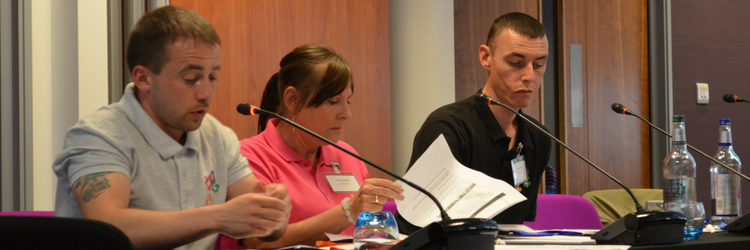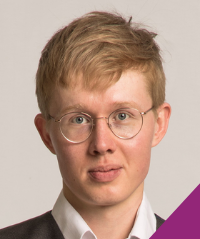
Scottish Drugs Forum were delighted to have an Erasmus+ Trainee from Estonia from October 2019 to March 2020 support and learn from the organisation.
Mikk Oja spent his time at Scottish Drugs Forum as an Inclusion and Peer Engagement Volunteer. Before joining us, Mikk recently graduated from Tallinn University, Estonia with a Master’s degree in Social Work where his thesis dealt with the reintegration issues faced by people with experience of substance use in Estonia. After graduating, he wanted to learn more about substance use issues and so enrolled in the Erasmus+ Traineeship where he was linked-in with SDF. Now back in Estonia, he has started working at the National Institute for Health Development.
In this blog post Mikk discusses his experience at SDF and thoughts on peer research.
 User involvement is an indispensable resource in every field that sets quality as one of its principles. First of all, it gives insight into the everyday lives and problems of substance users – a topic that has been notoriously difficult to study because of the stigma placed upon it by society. Stigmatisation in itself is already one of the reasons why we need to involve users themselves about their issues – others might not understand them or sometimes not even want to understand. This in turn creates self-stigmatization where users are not interested in sharing their issues with the wider society. Peer research, however, can surpass this opposition by having volunteers with lived experience as the researchers. Substance users can trust them as “their own”, as people with similar experience. This allows the researchers to get more accurate data from populations otherwise impossible to reach while reducing the marginalisation of users by telling them that their voices want to be heard.
User involvement is an indispensable resource in every field that sets quality as one of its principles. First of all, it gives insight into the everyday lives and problems of substance users – a topic that has been notoriously difficult to study because of the stigma placed upon it by society. Stigmatisation in itself is already one of the reasons why we need to involve users themselves about their issues – others might not understand them or sometimes not even want to understand. This in turn creates self-stigmatization where users are not interested in sharing their issues with the wider society. Peer research, however, can surpass this opposition by having volunteers with lived experience as the researchers. Substance users can trust them as “their own”, as people with similar experience. This allows the researchers to get more accurate data from populations otherwise impossible to reach while reducing the marginalisation of users by telling them that their voices want to be heard.
When the researcher-subject hierarchy is less present in the process, it opens up more possibilities for involving the volunteers themselves also. Doing research is an opportunity to give something back – to actualize oneself while building a more connected community. But to make all this actually work, the importance of peer research training has to be emphasized. This is because at the end of the day we are still doing real research that has its quality standards and principles. I have to admit my own doubts at the start on how well this is going to work, since I have seen many people struggling with research methodologies even in universities. I’m very glad to say that these doubts were unfounded and I was left wondering – how does it work? And I guess it must be the volunteers’ motivation to really achieve something and the sense of expertise in the field of substance use that is valued (accompanied of course by our excellent mentors!). I think it was the most memorable moment for me, when I was practicing doing an interview, following the standard questions and getting all the standard answers, and then being guided by another volunteer to actually put these standardized questions into context, to actually translate them for the interviewee. How often do people give misinformation just because they are asked the wrong questions! This is where the true value of expertise revealed itself to me – the knowledge on the issues experienced by substance users in that particular area with its unique social systems and culture. But this expertise truly shines when accompanied by good research skills. The skill of always knowing your boundaries is of key importance. One needs to hold the balance between a peer and a researcher and not slide into “war stories” or hijack the whole conversation.
Since my involvement with peer research was limited to the trainings, I was very happy to see some of the more experienced volunteers later presenting their work at a Recovery Orientated System of Care (ROSC) event. They were nervous, but also excited and so proud that their performance got a well-earned applause from the whole audience. Back in Estonia we are far from using a peer research model. The level of stigmatization is so high that among some user groups, we are still struggling to gather enough people to start support groups. And even though I have already done research training many times before, experiencing the whole peer involvement aspect of the process taught me much about the value of involving users and the wider community as a whole. This experience has certainly been inspirational and something for me to take home and start working towards.
